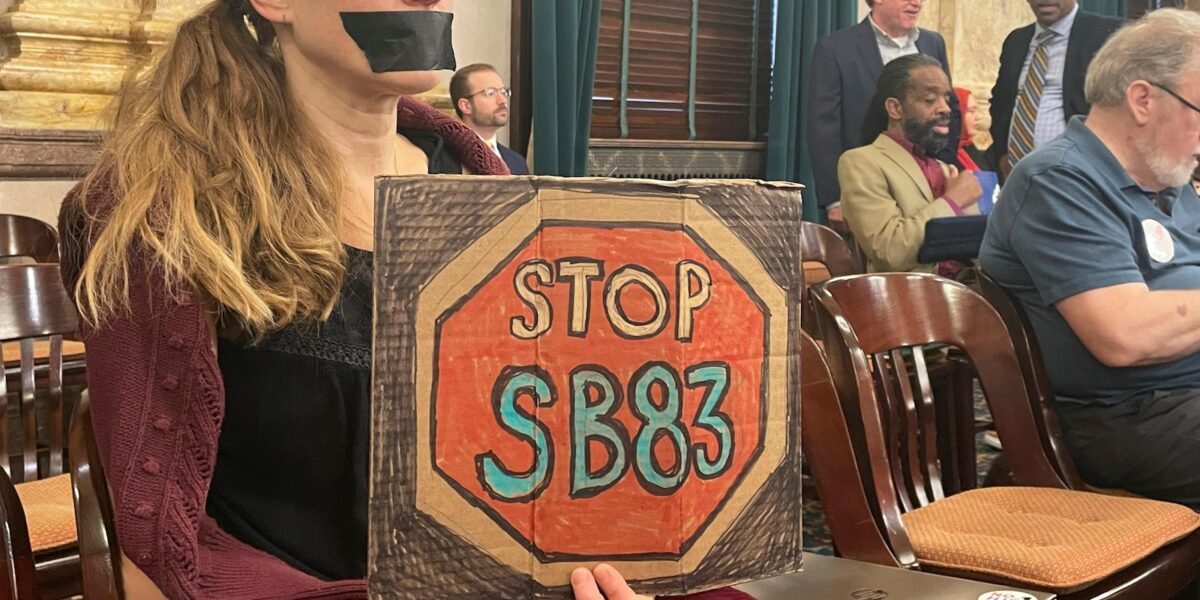COLUMBUS, Ohio — A bill banning diversity, equity and inclusion programs at Ohio’s public colleges and universities and stripping certain collective bargaining and tenure protections from faculty cleared the Republican-led Ohio Senate on Wednesday, over the objections of more than 1,000 students, educators and others.
Senate Bill 1 would make schools promise not to influence student views on “controversial” topics, eliminate the voting rights of student trustees at Ohio State University, require every Ohio college student to take a three-hour civics education course, and impose dozens of other programmatic and administrative changes. Schools that violate the measure — should it become law — would risk losing their state funding.
The bill cleared the Senate 21-11, marking the second time the chamber has approved similar legislation since 2023. It heads now to the Ohio House, where it died last session. However, the politics there have changed with the ascension of a new speaker.
Sponsoring GOP Sen. Jerry Cirino said the bill aims to protect “intellectual diversity,” including welcoming more conservative voices on campuses.
“SB 1 addresses the debacle that DEI has become,” Cirino said during floor debate. “It has morphed into institutional discrimination. It has resulted in students, staff and faculty experiencing discrimination if they do not fit the orthodoxy of DEI. This discrimination must end, along with the millions of dollars that have been spent supporting these often very large (DEI) organizations.”
Democratic senators vehemently pushed back against Republicans’ arguments in favor of the bill, with several Black senators delivering particularly fiery rebuttals.
State Sen. Hearcel Craig, a Columbus Democrat who is Black, noted that white supremacist groups have marched in Columbus and Cincinnati in recent weeks. He said it is important at this historical moment that colleges and universities have the opportunity to tell “the truth, the whole truth and nothing but the truth” about Black history in this country.
He added that DEI programs benefit not only Black students, but veterans, women, those with disabilities and others.
“Every student who has benefited from DEI programs proved themselves to be more than capable and deserving of opportunities to attend universities,” he said. “They weren’t just handed an education; they worked for it.”
Senate Higher Education Chair Kristina Roegner said that colleges and universities are supposed to be places where students “can learn without prejudice.”
“They can speak their mind without being canceled. They can consider all sides of an issue, make up their own mind, and they can be honest about their positions without fear of faculty retaliation,” she said. “Unfortunately, higher education across our nation largely has become a bastion of liberal bias. True, there are instances where this is not the case. But it has become pervasive enough that we must act.”
Democratic Sen. Bill DeMora, of Columbus, called the bill “anti-union, anti-free speech” and said its passage could contribute to political divisions that are growing more stark — given that nearly every topic can be defined as “controversial.”
“Essentially, any one person is allowed to report their school for any professor doing any one thing they don’t like and their schools could potentially lose all their funding because of it,” he said. “It’s completely ridiculous, and that’s the big reason my colleagues and I call this the death of higher education as we know it.”
Newly confirmed Ohio Lt. Gov. Jim Tressel, a former Buckeyes football coach who spent most of his career in higher education, said Wednesday that he was serving as president of Youngstown State University when work began on Cirino’s first bill.
He said that it was too early for him to take a position on the legislation though he generally sees the value in diversity at higher education institutions. In fact, he started an initiative as Youngstown’s president to foster acceptance and understanding among different students, he said.
“Growing up, I always thought that the word ‘university’ meant ‘unity’ and ‘diversity,’ because people come from a lot of different places — different cultures, different homes, different little towns,” he said in an Associated Press interview. “And then they come together on a college campus, and all the sudden you’re with people you haven’t spent much time with, and here’s your chance to learn about them, become aware of what their thoughts are and what’s important to them.”


